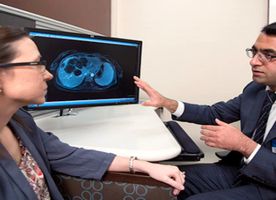Colectomy in Philippines
Search and Compare the Best Clinics and Doctors at the Lowest Prices for Colectomy in Philippines






Colectomy at Asian Hospital and Medical Center in Metro Manila, Philippines





Colectomy at The Medical City in Metro Manila, Philippines





Colectomy at St. Luke's Medical Center in Metro Manila, Philippines
Our partner clinics in are accredited by the following associations






















































































































































No Time?
Tell us what you're looking for and we'll reach out to the top clinics all at once
WHY US?






















































































































































No Time?
Tell us what you're looking for and we'll reach out to the top clinics all at once
What does a Colectomy Procedure Involve?
A colectomy procedure in Philippines typically entails either of two methods - a laparoscopic or an open surgery. The laparoscopic method, referred to as minimally invasive surgery, involves making small incisions in the abdomen through which specialized surgical tools are inserted. The open surgical procedure involves a larger incision to provide direct access to the colon.
To begin, the patient is usually placed under general anaesthesia. The surgeon will then make strategic incisions, remove the diseased parts of the colon, and reconnect the remaining parts to restore function. Depending on the extent of the disease, sometimes the entire colon may have to be removed. In such cases, the surgeon creates an artificial passage (stoma) for waste to leave the body.
How Long Should I Stay in Philippines for a Colectomy Procedure?
The length of your stay in Philippines post a colectomy procedure predominantly hinges on your unique recovery pace and the surgical method employed. As an example, for those undergoing a laparoscopic colectomy, hospitalization generally ranges between 3 to 5 days. For patients who've undergone an open colectomy, the hospital stay might extend up to a week, sometimes longer.
Keep in mind, that these timelines represent averages; individual recovery varies significantly. Hence, it is absolutely essential not to rush your healing process. Instead, give your body the necessary time to recuperate. Therefore, considering an additional few days in Philippines beyond your hospital stay would be a wise course of action. This added time helps accommodate rest, and any needed follow-up visits, and makes certain that you are fit enough for your journey home.
A discussion with your own healthcare provider can provide a more accurate timeline, as they can offer a tailored plan based on your personal health condition and expected pace of recovery.
What's the Recovery Time for Colectomy Procedures in Philippines?
Estimating the recovery time for colectomy procedures in Philippines can vary significantly, reflecting each person's overall health, resilience, the type of surgery undertaken, and the uniqueness of each case. For those who've undergone a laparoscopic procedure, it usually takes about 2 to 3 weeks to return to their customary activities. Nevertheless, in cases involving open surgery, the recovery could extend to approximately 6 weeks or even more.
Following surgery, it's completely natural to feel some level of fatigue and weakness. Recovery is a gradual process, and it's crucial to afford your body the necessary time to recuperate appropriately. You should prioritize a balanced diet for optimal healing and slowly reintegrate your everyday activities.
What's the Success Rate of Colectomy Procedures in Philippines?
Successful Colectomy procedures in Philippines are notably high in number, owing largely to the proficient expertise and robust experience of the region's surgical specialists, complemented by leading-edge medical technologies. Nevertheless, a multitude of factors can influence the precise success rate, such as a patient's unique health condition, the kind and advancement stage of the disease, and any co-existing health disorders that may interfere with the recovery trajectory.
It's important to emphasize that while a colectomy can offer significant relief from symptoms and substantial improvement in life quality for people battling colon-associated ailments, all surgical treatments carry an intrinsic risk and potential complications. Hence, the notion of 'success' should be assessed holistically, combining the surgical outcome with the enhancement in the patient's life experience post-operation.
Are there Alternatives to Colectomy Procedures in Philippines?
Yes, in Philippines, there are alternatives to colectomy procedures that can be explored. The suitability of these options largely depends on the stage and severity of the bowel disease and the overall health of the patient. Certain non-surgical treatment methods such as medications or lifestyle changes may suffice in cases of mild to moderate bowel conditions. These approaches primarily focus on managing symptoms and, if possible, avoiding surgery.
Here are some of these alternatives:
• Certain medical conditions like Crohn's disease and ulcerative colitis may often be managed with different classes of drugs. These can range from anti-inflammatory medicines to immunosuppressants and antibiotics.
• Dietary modifications can also hold a significant influence on managing bowel conditions. This is particularly displayed in the handling of Irritable Bowel Syndrome (IBS), where foods triggering symptoms can be identified and avoided.
• Another lifestyle determinant is stress management. Techniques that help control stress levels can contribute positively to managing IBS and other related conditions.
However, it is crucial to note that when the disease is severe or advanced, surgical actions like a colectomy could be the most successful course to take. These options should be discussed thoroughly with your healthcare provider to make an informed decision and to opt for the treatment strategy best suited to your condition and lifestyle.
What sort of Aftercare is Required for Colectomy Procedures in Philippines?
After a colectomy procedure in Philippines, careful aftercare is needed for optimal recovery. As part of your aftercare, your medical team will provide you with specific instructions tailored to speed up healing and mitigate possible complications. You'll likely need to adhere to a special diet to help your digestive system adjust. Foods that are easy to digest, like highly nutritious broths, will typically be suggested initially.
It's also vital to remain vigilant about your wound care to prevent infection. Your healthcare provider will typically discuss proper wound care techniques with you, which might include regular dressing changes and monitoring for any signs of infection. As part of your aftercare, you'll likely have scheduled follow-up appointments with your surgeon to monitor your progress. It is equally imperative that you maintain a balanced lifestyle: healthy diet, gentle exercise as approved by your doctor, and adequate rest. Following these guidelines is key for a smooth recuperation process.
This information has been accurately sourced and verified by a medical professional for its accuracy, however, we strongly recommend you to consult with your doctor before pursuing medical procedures overseas.

